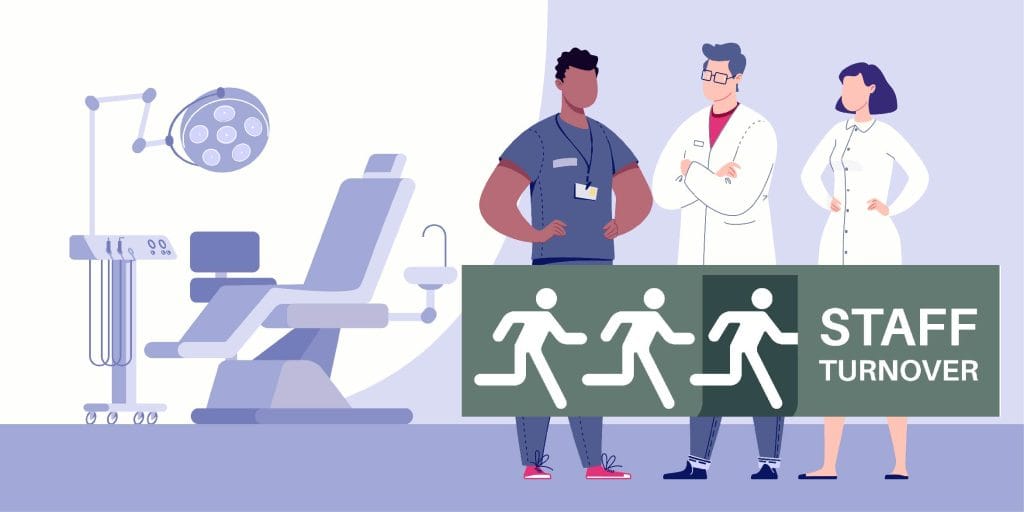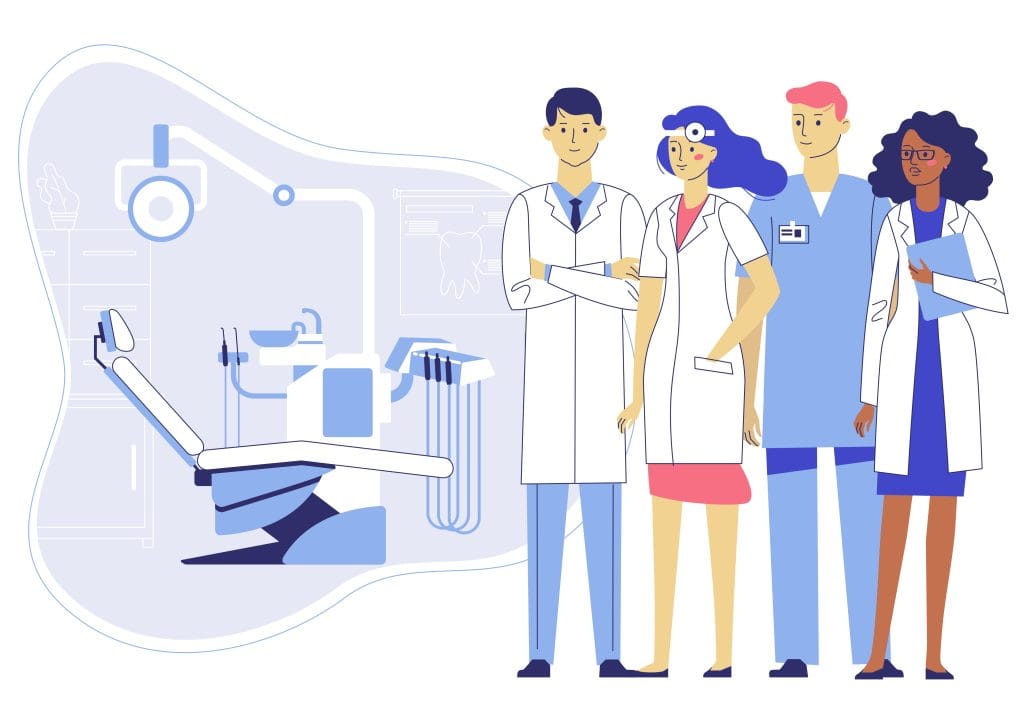Last updated on October 2nd, 2024 at 05:23 pm
 In any thriving dental practice, treatment acceptance and follow through are critical to both patient health and practice success. Managing this process effectively can be a challenge without a well-structured approach—and that’s where a Treatment Coordinator comes in.
In any thriving dental practice, treatment acceptance and follow through are critical to both patient health and practice success. Managing this process effectively can be a challenge without a well-structured approach—and that’s where a Treatment Coordinator comes in.
A Treatment Coordinator is essentially the sales department of a dental office, guiding patients through the financial and logistical aspects of their care. From discussing treatment options and payment plans to following up with patients who haven’t yet committed to treatment, the Treatment Coordinator plays a pivotal role in generating revenue and ensuring patients receive the care they need.
Whether your practice already has a Treatment Coordinator or you’re considering adding one, it’s important to know how to optimize this role—and at what point your growing practice might need more than one.
Why Every Practice Needs a Treatment Coordinator
Again, the Treatment Coordinator serves as the sales force of your dental practice, ensuring patients not only understand the treatment plan but also agree to follow through. Their role is more than helping to explain procedures—it’s about making the financials work for both the patient and your office. Without a Treatment Coordinator owning this vital function, practices may struggle with poor acceptance, higher than normal incomplete treatment plans, lost revenue, and patients who are not getting the full dental care they need.
And here’s the funny part. Whether you have a Treatment Coordinator or not, the functions and duties of a Treatment Coordinator MUST be accounted for and done on a regular basis.
For a small practice, it might be the Office Manager filling this role along with their other duties. However, as the practice grows, these duties will demand more and more time and dedicated attention. For that matter, the Treatment Coordinator duties are usually the last “role” that an Office Manager “turns over” to another team members. Starting out, it may have been just you and your manager, then as the practice grows, the Office Manager begins hiring other administrative staff to pick up various functions, scheduling, phones, insurance verification and filing, etc. But still, your manager is sitting in on treatment presentations and handling financial arrangements – at least for larger cases. Until finally, it steals so much time from the Office Manager role that a full time employee needs to be brought in (or promoted from within), to grab this position. In larger growing practices or those experiencing rapid growth, that single Treatment Coordinator may find themselves overwhelmed, with the Office Manager stepping back in to pick up the slack. Now, multiple Treatment Coordinators may be required to manage the increasing patient load effectively.
Defining the Role of a Treatment Coordinator
While the job description of a Treatment Coordinator can vary across practices, the core responsibilities remain focused on one key outcome: patient treatment acceptance and follow through. In some offices, Treatment Coordinators may also manage patient scheduling or focus solely on new patient intake. But the most critical part of their role is to ensure patients move forward with their treatment plans, which includes handling the finances in accordance with practice policy. A Treatment Coordinator’s success can be measured by income generation and how well they keep the practice’s schedule filled with active, paying patients.
In addition to being an integral part of treatment presentations, they would also follow up with patients who didn’t accept at the time treatment was presented. Every practice has an incomplete treatment list. Some practices even feel a sense of “security” knowing that there is all that treatment yet to be done, while others dread seeing the number of patients who haven’t committed. In either case, the Treatment Coordinator’s job is to actively manage this list by contacting patients who have not scheduled or completed their recommended treatments.
Following up with these patients is a critical function for the Treatment Coordinator. After all, they are not sitting in treatment presentations or discussing financial arrangements with patients every minute of the day. Well, when they are directly in front of a patient, they should be following up on patients with incomplete treatment!
And this follow up may take many forms:
- For recent presentations where a patient had an issue that needed to be handled before proceeding (i.e. refinancing their house and can’t apply for credit for a month), the Treatment Coordinator stays on top of these to ensure the patient moves forward when these issues are resolved.
- Then there’s the patients who didn’t accept for any particularly good reason e.g. “I need to think about – which is usually the bulk of your incomplete treatment list. What might the Treatment Coordinator do with these? Well,
- For patients on the incomplete treatment list that are unscheduled and overdue for recall: schedule them for a recall appointment. Sure you may call this patient and all of a sudden they decide they want to move forward with treatment – but that’s usually not the case. Fine then – get them back into hygiene and the treatment presentation process can begin anew – with them in the practice and in front of the doctor. Or
- If they are not overdue for recall, the Treatment Coordinator could call them in to have the doctor check on the condition the doctor diagnosed last time they were in to ensure everything is staying stable. In any event, especially if they have active disease, you want to do everything in your power to get them to take care of it.
When Do You Need a Treatment Coordinator?
If you don’t have a full time dedicated Treatment Coordinator, when would you bring one in? Well, deciding when you need a Treatment Coordinator —or when to hire an additional one —depends on your practice’s volume and workflow. If you don’t have one now, again most likely your office manager is filling this role part time.
At some point, however, your office manager may find themselves spending three to four (or more) hours a day in treatment discussions. In addition to a clear sign that you need a Treatment Coordinator, this is also an indication that they no longer have adequate time to effectively manage the practice. They become less available for overseeing daily operations, handling emergencies, or addressing other staff issues. When things come to this pass, it’s time to bring in a dedicated Treatment Coordinator.
Treatment Coordinator, this is also an indication that they no longer have adequate time to effectively manage the practice. They become less available for overseeing daily operations, handling emergencies, or addressing other staff issues. When things come to this pass, it’s time to bring in a dedicated Treatment Coordinator.
Another indication that you might need to hire a Treatment Coordinator is the sheer volume of patient encounters. Specifically relating to treatment discussions. If you are handling five to six treatment presentations a day, with patients coming from both new patient visits and patients of record in hygiene, your office will likely benefit from someone focused solely on this role. And again, keep in mind that a part of the Treatment Coordinator position is follow up. Follow up time should be baked into the job. If you have a Treatment Coordinator in presentations all day long, then they won’t have time to do this and you may need more help in this area. If they can’t keep up with the demand for follow-ups, you risk losing significant revenue and patient care opportunities.
How to Hire a Treatment Coordinator
The ideal scenario is to promote from within. Dental assistants, in particular, can make excellent Treatment Coordinators because they are already familiar with dental terminology and procedures. They also have firsthand experience with the doctor’s clinical skills, which gives them the confidence about what their doctor and practice are capable of doing.
If you promote from within, you’ll want to invest in training to ensure they’re ready to handle the full responsibilities of the role. Specifically in improving their communication and sales skills. It’s not uncommon for clients to bring their Treatment Coordinators with them to MGE to do the MGE Communication and Sales Seminars along with further sales training. As you begin the in-house portion of their training, you may have them sit in on treatment presentations with the office manager, gradually allowing them to take over portions of the discussion, such as helping the patient apply for financing. Over time, and as they get more communication and sales training, they will become more comfortable and proficient, eventually taking on larger treatment plans and more complex financial arrangements.
While promoting from within is ideal, it’s not always feasible. If you need to hire externally, look for candidates with strong communication and organizational skills, preferably with experience in a dental office or medical practice. And again, be prepared to train them thoroughly.
The Impact of Growth on Treatment Coordinator Staffing
As your practice grows, you’ll need to reassess your staffing needs regularly. An increase in new patients, expanding services like implants or cosmetic dentistry, or additional providers (such as associate dentists or hygienists) all contribute to more treatment plans that need coordination.
For example, if your practice has recently launched a new marketing campaign and is now seeing 80-100 new patients a month, it may be time to hire another Treatment Coordinator. Managing this influx of new patient treatment plans while also handling follow-ups from hygiene appointments can quickly overwhelm a single coordinator.
When to Hire a Second (or Third) Treatment Coordinator
 Knowing when to add another Treatment Coordinator depends largely on patient volume and the complexity of the treatments you’re offering. If your practice sees an average of six or more patient encounters per day that involve treatment planning, plus the need for regular follow-up calls, it’s likely time to bring in another coordinator.
Knowing when to add another Treatment Coordinator depends largely on patient volume and the complexity of the treatments you’re offering. If your practice sees an average of six or more patient encounters per day that involve treatment planning, plus the need for regular follow-up calls, it’s likely time to bring in another coordinator.
A good rule of thumb is to look at the balance between new patient encounters and ongoing care for existing patients. If one Treatment Coordinator is spending the majority of their time handling new patients and has little time left for follow up, it’s time to expand the team. Practices that offer specialized services, such as implant or cosmetic procedures, often require Treatment Coordinators to manage not only face-to-face consultations but also extensive phone and email follow-up to turn leads into appointments.
Adding another Treatment Coordinator also ensures that no patients slip through the cracks. I’ve seen practices where one Treatment Coordinator is dedicated to handling new patient treatment plans and another focused on recall and incomplete treatment plans can help maximize both patient care and practice revenue. It can also prevent burnout, allowing each coordinator to focus fully on their specific responsibilities without becoming overwhelmed by the workload.
Conclusion
The role of the Treatment Coordinator is indispensable to the success of a dental practice. As the sales engine of your business, they are responsible for ensuring patients accept and start their treatment plans, thus directly impacting your practice’s revenue and the health of your patients. Knowing when to hire a Treatment Coordinator—and when to expand the team—can make a significant difference in how smoothly your practice operates.
By ensuring that you have the right people in place to handle treatment presentations, financial arrangements, and patient follow-ups, you set your practice up for success. Whether you’re just hiring your first Treatment Coordinator or considering adding more to your team, keeping an eye on patient volume, incomplete treatment lists, and your office manager’s workload will help you make the best staffing decisions.
If you’d like more information on how to train and implement a Treatment Coordinator role in your practice, give us a call at (800) 640-1140 or email me at Sabrib@mgeonline.com.


No Comments
Be the first to start a conversation